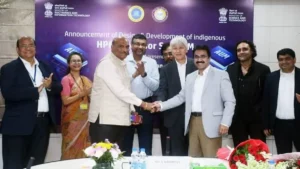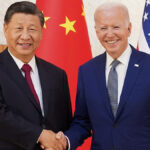Introduction:
The Biden administration is intensifying efforts to tighten restrictions on China’s Semiconductor Access technology, urging key allies such as the Netherlands, Germany, South Korea, and Japan to enhance existing controls.
This controversial move aims to curb China’s progress in developing domestic chip capabilities and address gaps in export controls imposed over the past two years.
However, resistance from some countries, including Japan and the Netherlands, highlights the complexity and potential ramifications of such measures.
Follow us on LinkedIn for everything around Semiconductors & AI
Background:
Since 2022, the Biden administration has targeted China’s semiconductor industry, imposing significant controls on the export of advanced chip-making machines and sophisticated chips essential for artificial intelligence development.
Despite these efforts, gaps remain in the ability of Japanese and Dutch engineers to conduct equipment repairs and in the flow of spare parts crucial for semiconductor manufacturing equipment.
Dominant Players in Equipment and Materials: These countries are leading players in the production of crucial equipment and materials needed for advanced chip manufacturing. Here’s the breakdown:
- Netherlands: Home to ASML, the world’s only manufacturer of the most advanced chipmaking machines, Extreme Ultraviolet (EUV) lithography systems. These machines are vital for producing the most powerful and miniaturized chips.
- Japan: A major supplier of various chipmaking chemicals and other materials essential in the production process. Without these materials, even with the equipment, China would struggle to manufacture advanced chips.
The shock of China’s Huawei Technologies unveiling a smartphone powered by a homemade chip in August added urgency to the US’s push for stricter controls.
Current Developments:
The US wants to maintain a technological edge over China. By limiting access to these crucial components, the US aims to slow down China’s progress in areas like artificial intelligence and military technology. Additionally, cooperation from these allies strengthens the US’s position in negotiations and reduces the risk of China acquiring the technology through alternative channels.
The latest push by the Biden administration includes urging the Netherlands to restrict ASML Holding NV from servicing and repairing sensitive chipmaking equipment sold to Chinese clients before recent sales limits.
Additionally, Japan is being pressed to limit exports of specialized chemicals critical for chipmaking, including photoresist, with key companies like JSR Corp. and Shin-Etsu Chemical Co. under scrutiny.
Challenges and Resistance on China’s Semiconductor Access:
Tokyo and The Hague have responded cautiously to Washington’s latest efforts, emphasizing the need to assess the impact of current restrictions before considering tighter measures. While the US Commerce Department raised the issue during a meeting in Tokyo, both Japanese and Dutch officials are skeptical about the proposed changes.
- Economic Concerns: Both Japan and the Netherlands have strong economic ties with China. Restricting chip sales could hurt their businesses and lead to retaliation from China.
- Disruption of Supply Chain: The global semiconductor supply chain is complex and interconnected. Stricter limitations could lead to shortages and price hikes for everyone involved, including the US.
- Loss of Leverage: If they completely cut China off, Japan and the Netherlands might lose some influence over China’s chip development. Maintaining some level of trade allows them to potentially steer China’s technological path in a more cooperative direction.
- Limited Effectiveness: Some argue that China will eventually develop its own chipmaking capabilities, making these restrictions a temporary measure at best.
The US is urging them to prioritize national security concerns, but these economic and strategic considerations make it a tough decision for Japan and the Netherlands. They’re likely looking for a balance between maintaining a strong relationship with the US and protecting their own economic interests.
Impact on ASML and Germany:
ASML, a Dutch company crucial for chip-making equipment development, requires a license to service and repair restricted gear in China.
The US is pushing the Netherlands to adopt a more stringent approach in granting such licenses. Furthermore, the Biden administration aims to include Germany in the export control agreement, pressuring Carl Zeiss AG, a specialized glass maker supplying ASML, to refrain from shipping critical components to China.
Read More: Top 3 Indian Semiconductor Companies Attracting Huge Foreign Investment – techovedas
Multilateral Approach:
The Biden administration is working to expand its export-control alliance, already including Japan and the Netherlands, to encompass Germany and South Korea.
Given their key roles in the semiconductor supply chain, these countries are crucial to the success of the initiative.
Talks with South Korea on chip export controls began in February, reflecting the importance of a united front against China’s semiconductor ambitions.
Conclusion:
The global semiconductor landscape is witnessing heightened tensions as the US seeks to strengthen restrictions on China’s access to semiconductor technology.
The resistance from key allies, coupled with the complexity of the semiconductor supply chain, underscores the challenges faced by the Biden administration in implementing these measures.
The outcome of these efforts will not only impact the semiconductor industry but may also have broader geopolitical implications. The situation warrants close monitoring as the US endeavors to forge a united front against China’s semiconductor advancements.








